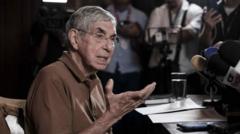In a press conference held in San José, Costa Rica, he expressed his bewilderment as he received a brief email notification regarding the visa decision. Although he pointed fingers toward the US State Department rather than Trump himself for the revocation, he hinted at a possible link to his diplomatic ties with China formed during his presidency from 2006 to 2010. Notably, Arias had established relations with China in 2007, severing ties with Taiwan—a decision that has drawn attention in light of the Trump administration's criticism of Central American nations engaging with Chinese interests.
Arias openly disapproved of the current Costa Rican administration's inclination towards the US, specifically referencing President Rodrigo Chaves' stance on excluding Chinese firms from 5G developments, contrasting it with his own governance which he believed retained Costa Rica’s autonomy from US directives. Furthermore, he emphasized that he was not an isolated case, noting that several other Costa Rican officials opposing current government actions have also faced similar visa revocations.
This incident illustrates the complex interplay between US foreign policy and regional leaders, raising questions about the implications of political critiques on diplomatic relations.
Arias openly disapproved of the current Costa Rican administration's inclination towards the US, specifically referencing President Rodrigo Chaves' stance on excluding Chinese firms from 5G developments, contrasting it with his own governance which he believed retained Costa Rica’s autonomy from US directives. Furthermore, he emphasized that he was not an isolated case, noting that several other Costa Rican officials opposing current government actions have also faced similar visa revocations.
This incident illustrates the complex interplay between US foreign policy and regional leaders, raising questions about the implications of political critiques on diplomatic relations.





















